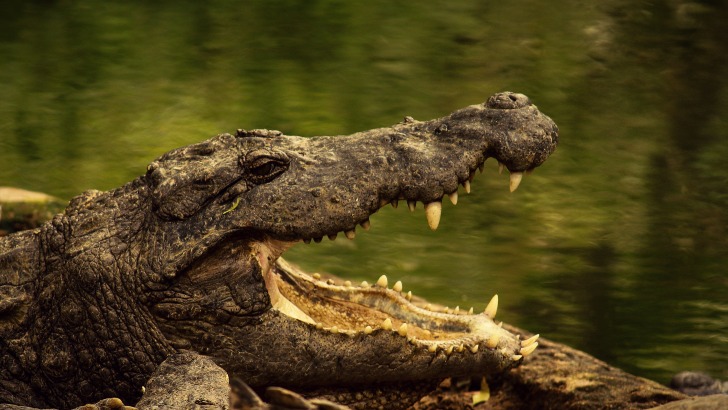In 1802, fifteen years before Mississippi became our 20th state, the American alligator received its current scientific name, Alligator mississippiensis, thanks to the efforts of French zoologist François M. Daudin.
Consequently, the alligator got its name from the river where the specimen lived, not the state of Mississippi.
At the time, the alligator population had suffered a severe reduction from human contact and overzealous hunting.
According to the Mississippi Department of Wildlife, Fisheries, and Parks, Mississippi’s alligators’ number approximately 38,000.
About 7500 of the state’s alligators make their home in the Pascagoula River basin in Jackson County, one of the three southernmost counties.
Coupled with neighboring Harrison and Hancock counties to the west, 38 percent of Mississippi’s alligator population call the Gulf Coast’s inland freshwater waterways home.
The Mississippi Department of Wildlife, Fisheries, and Parks does not classify alligators existing and minding their business in public waterways as nuisances, regardless of their size.
In fact, for people who build homes in an alligator’s natural habitat, the MDWFP considers the apex predator an amenity of marshland life.
Consequently, they will only remove one that shows aggression, begs for food, or gets into a swimming pool, tool shed, or garage and refuses to leave.

Contents
- So, Do Alligators Live in Mississippi?
- Which Alligator Species Inhabit Mississippi Waterways?
- Is it Safe to Swim in Mississippi?
- Interesting Alligator Facts About Mississippi Alligators
- Alligators vs. Crocodiles vs. Caiman
- Safety Tips for Swiming in Alligator-Infested Mississippi Waters
- Summary
- Mississippi Safety Overview
- Frequently Asked Questions
- How many people in Mississippi die every year from alligator attacks?
- Is it safe to swim, fish, or boat near alligators?
- Can I hunt alligators in Mississippi?
- Which came first: the alligator's name or Mississippi's statehood?
- Where do most of Mississippi's alligators live?
- How many Mississippi counties have no alligator sightings at all?
- What number of alligators live in Mississippi?
- How do I report a nuisance alligator?
So, Do Alligators Live in Mississippi?
Except for 14 counties in the northernmost portion of the state, you can find alligators anywhere you see surface water.
However, most tend to avoid human contact.
Feeding alligators anywhere in Mississippi violates the law.
Doing so encourages these predators to view humans as a food source and increases the chance of a tragic event.
Mississippi never had any recorded unprovoked alligator attacks through 2015.
Moreover, according to MDWFP Alligator Program Coordinator Ricky Flynt, none of the recent bite incidents resulted in any serious injuries or fatalities either.
The most recent incident, in which a Mississippi teen received puncture wounds on one hand while swimming, occurred June 6, 2022, at MS 26 on Red Creek, in Stone County and resulted from people feeding the young alligator that bit him.
Which Alligator Species Inhabit Mississippi Waterways?
The American alligator, Alligator mississippiensis, lives and thrives throughout all but 14 counties in Mississippi.
The current alligator population represents one of the most successful comebacks in US environmental history.
Just 20 years on the endangered species list and a joint relocation effort from Louisiana to Mississippi combined to create the most stable breeding population of alligators throughout its habitat.
In addition, severely restricted hunting and trapping and keeping alligator feeding illegal mean few alligators become nuisances, need relocation, or require euthanasia.
Wildlife officials have educated Mississippians through the Alligator Awareness in Mississippi program that a fed alligator is a dead alligator.
Mississippi’s reporting system for people caught feeding alligators includes a phone number for each of the three regions managed by MDWFP.
To report a nuisance alligator or anyone seen violating Mississippi alligator regulations, call 1-800-BE-SMART or contact the correct regional office:
- North Regional Office (662) 563-6222 in Enid
- Central Regional Office (601) 859-3421 in Canton
- South Regional Office (601) 783-2911 in Magnolia
Is it Safe to Swim in Mississippi?
Even in inland waterways, alligators usually avoid humans.
And until this year, no one had ever recorded an alligator attack in Mississippi.
Feeding and harassing alligators are against the law for a good reason.
Alligators defend their nests.
Feeding them or providing automated fish feeders encourages these predators to lose their natural caution around humans.
Thanks to their heightened sense of smell, alligators do not distinguish an extended hand from the food handed to them.
They will snap quickly and viciously when hungry.
Despite having more than a third of the state’s alligators in the three Gulf Coast counties, you have a much higher chance of getting an infection from Vibrio vulnificus.
A bacteria in Mississippi’s brackish waterways.
The bacteria enter cuts or open wounds and cause a severe, sometimes life-threatening disease.
Additionally, drownings kill more Mississippians than alligator attacks.
According to the CDC, nearly one person drowns for every 50,000 swimmers in the state.
Interesting Alligator Facts About Mississippi Alligators
- Alligator jaws clamp down at 2125 PSI, more than 13 times as strong as a human bite.
- An alligator took up residence in Hiller Park in Biloxi, Mississippi. Unfortunately, due to parkgoers feeding it, the 11-foot long, 600-pound beast had to be put down in 2011.
- The fine for feeding alligators in Mississippi ranges between $1000 to $5000 and includes a mandatory five-day stay in jail.
- The longest alligator ever caught in Mississippi measured 14 feet, 3/4 inches long. Stephen Brady, Bryan Burnside, Colby Acy, and Anthony Acy harvested the behemoth in 2017.

Alligators vs. Crocodiles vs. Caiman
Alligator eyes reflect light, making them visible at night.
These reptiles love basking along the water’s edge at dawn and dusk.
Their U-shaped snouts contrast with the long V-shapes of crocodiles and shorter v-shaped snouts of caimans.
Unlike other states where alligator populations live alongside other large reptile species, no credible sightings of crocodiles or caimans exist.
One determined alligator, however, took a vacation in the waters between Deer Island and Biloxi Beach in May 2022, sunning himself near the Biloxi Lighthouse.
Safety Tips for Swiming in Alligator-Infested Mississippi Waters
The MDWFP recommends never leaving pets or small children unattended when swimming in alligator breeding grounds.
Never swim alone before dawn or after dusk, when alligator activity levels are highest.
Do not drink alcohol near alligators.
Your loss of judgment and situational awareness could get you or your swimming buddies maimed or killed.
Just because we have no recorded alligator fatalities in Mississippi does not make it safe to swim, frolic, or take selfies with them.
Alligators strike hard and fast when they attack, first stunning and then drowning their prey.
Alligators bite down with 2125 PSI, which makes it forceful enough to amputate an arm or leg.
Stay away from storm drains where alligator sightings have taken place.
Do not get closer when taking pictures of an alligator.
They run more than four times as fast as humans.
Alligators have a taste for dog meat, so keep your pets inside at night and do not walk them near known alligator basking sites.
Anywhere you see one alligator, chances are high that more lie just out of sight.
NEVER feed alligators.
A fed alligator is a dead alligator, according to MDWFP Alligator Program Coordinator Ricky Flynt.
In addition, once accustomed to receiving handouts from humans, alligators will approach and bite their would-be benefactors.
Summary
Mississippi protects its alligator population and does not allow extensive hunting.
Of the more than 38.000 alligators in the state, two-thirds spread themselves all over, while 38 percent live in the Wolf River and Pascagoula River.
No alligator has ever attacked or killed anyone in recorded Mississippi history.
However, several alligators since 2015 have become a nuisance and bitten a swimmer or angler in Mississippi.
Nevertheless, alligator bites recently caused minor puncture wounds on a teen’s hand and a bite on a hunter’s foot.
Exercise common sense and reasonable caution when swimming in Mississippi waters.
Alligators will defend their young for up to a year after hatching, not just their babies.
Young alligators stick together for protection and make loud, distressed chirps when in danger.
All adult alligators nearby, not just the mother gator, will investigate and attack the threat.
Do not approach, feed, harass, or harm any alligators in Mississippi.
In addition to hefty fines of $1000 to $5000 per alligator, you will spend almost a week in jail.
As always, do not drink alcohol near places where alligators bask along Mississippi lakes, lagoons, streams, farm ponds, or creeks.
Never lay down near the water’s edge or walk pets near alligator nesting sites.
NEVER allow small children to play where alligators live and breed in Mississippi waters.
Just because it hasn’t happened yet does not mean you want your child to be the first statistic.
When in doubt, get out. If you think something floating in the water might be an alligator, get to shore without splashing or thrashing and run as far away as possible.
Do not return to any place where alligators have approached you until you call the MDWFP to report its uncharacteristic behavior.
Authorities will send alligator specialists to remove the alligator.
Nuisance alligators in Mississippi do not get relocated.
Once they lose their fear of humans, euthanasia is the only option.
Mississippi alligator hunters keep the meat and hides as payment for their service to the community.
Give alligators in Mississippi a wide berth and your utmost respect.
Avoid alligator nests: they look like mounds of leaves, grass, and sticks.
Never try to subdue an alligator on your own.
Not only is it illegal, but you, the alligator, and any bystanders could also receive severe injuries from gator bites or tail lashes.
And remember, since alligators can climb, you must run at least 30 to 100 feet away instead of climbing onto a car, parking pillar, tree stump, or rock.
An alligator’s tail makes up half its body length.
A determined alligator can and will stand with its tail and climb obstacles with its sharp claws.
As tempting as it might be to kill a nuisance alligator, you must wait for the proper authorities to take care of the problem.
Then, call the correct region’s number to report people feeding alligators or any unusual actions taken by Mississippi’s ordinarily shy alligators.
Prevention wins whenever it comes to avoiding alligator tragedies.
Mississippi Safety Overview
READ THE FULL REPORT: Mississippi Safety Review
Safety Index:
- OVERALL RISK: MEDIUM
- TRANSPORT & TAXIS RISK: LOW
- PICKPOCKETS RISK: LOW
- NATURAL DISASTERS RISK: MEDIUM
- MUGGING RISK: LOW
- TERRORISM RISK: LOW
- SCAMS RISK: LOW
- WOMEN TRAVELERS RISK: LOW
Frequently Asked Questions
How many people in Mississippi die every year from alligator attacks?
No one on record has ever died of an alligator attack in Mississippi.
Is it safe to swim, fish, or boat near alligators?
When in doubt, GET OUT. Once you spot an alligator, leave the water immediately without splashing or squealing.
Can I hunt alligators in Mississippi?
Only hunters who undergo alligator training programs and carry a valid Mississippi hunting license AND an alligator hunting permit may harvest alligators.
You may only harvest one alligator over four feet and one alligator over seven feet.
In addition, you must have a public waterway alligator permit in state waters and a private waterway permit on privately-owned property.
NO ONE can hunt, trap, or possess alligators or alligator parts without a federal CITES permit AND a state tag on the animal or its hide and carcass.
Which came first: the alligator's name or Mississippi's statehood?
The alligator got its scientific name in 1802, while Mississippi statehood took place on December 10, 1817.
Where do most of Mississippi's alligators live?
Thirty-eight percent of all the state’s alligators live in Jackson, Harrison, and Hancock counties.
How many Mississippi counties have no alligator sightings at all?
Fourteen counties do not have any alligators.
What number of alligators live in Mississippi?
Thirty-eight thousand alligators reside throughout the state.
How do I report a nuisance alligator?
Dial 1-(800) BE SMART.











